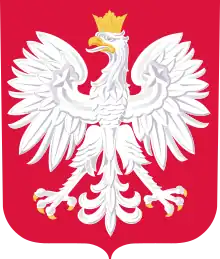| Aksak | |
|---|---|
 | |
| Alternative name(s) | Akszak, Axak, Kara, Obrona |
| Earliest mention | 14th century[1] |
| Families | 20 names Aksak, Akszak, Assanowicz, Białocki, Downarowicz, Erbejder, Erbreiter, Grużewicz, Hurko, Janczura, Kardasewicz, Kardaszewicz, Kasperowicz, Okieńczyc, Okińczyc, Seliminowicz, Selimowicz, Szaguniewicz, Szahuniewicz, Talkowski. |
Aksak is a Polish coat of arms of Tatar origin. It was used by several szlachta families in the times of the Polish–Lithuanian Commonwealth.
History
Kasper Okińczyc was granted with a noble title by King Jan III Sobieski in 1683, after the Battle of Vienna, together with an estate called Luzinky. He was given also the command over the garrison of the city of Mścisław (modern Mstislav, Belarus), close to the border with Muscovy
The name of the coat of arms stems from Okińczyc's personal nickname, possibly a Turkish language word aksak meaning lame. Possibly Okińczyc received a wound during the battle and started using the term as his nickname and later as a name of the symbol of his family.
Blazon
The blazon exists also with a heart pierced by an arrow, with blood drops.[2]
Notable bearers
Notable bearers of this coat of arms include:
- Okińczyc family
Gallery
 Aksak II variation
Aksak II variation Aksak III variation, could be also a variation of the Przyjaciel coat of arms according to Znamierowski[3]
Aksak III variation, could be also a variation of the Przyjaciel coat of arms according to Znamierowski[3]
See also
Bibliography
- Tadeusz Gajl: Herbarz polski od średniowiecza do XX wieku : ponad 4500 herbów szlacheckich 37 tysięcy nazwisk 55 tysięcy rodów. L&L, 2007. ISBN 978-83-60597-10-1.
References
- ↑ Juliusz Karol Ostrowski, Księga herbowa rodów polskich.
- ↑ Genealogy of Kaspar Aksak Okinczyc Archived 2011-07-16 at the Wayback Machine
- ↑ Alfred Znamierowski, Herbarz rodowy.

